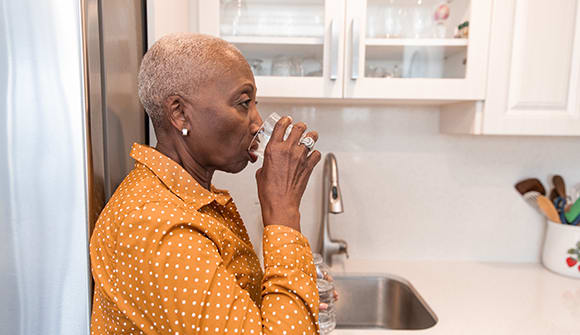Worried sick
Your partner is anxious. How can you help?
Article Date:

You’ve tried everything: listening to their concerns, attempting to understand their fears, seeking the advice of friends and family. But taking care of a spouse who is battling anxiety can be draining. Their worries can spill over into other aspects of your life and, in turn, foster anxiety in you.
That’s why it’s critical to learn how to help your partner manage their anxiety so you can both thrive together. Sometimes, this is referred to as “co-regulation.”
Ways to help your partner deal with anxiety
Andrew King, PhD, a psychologist with Baptist Behavioral Health, offered some advice for spouses whose partners are battling anxiety.
1. Validate and acknowledge your partner's feelings without patronizing them.
Saying something like, "Snap out of it," or worse yet, "Calm down," will upset your partner, as people often can't fully control or understand the feelings they're having. Encourage your partner to talk about their anxiety: what does it feel like physically? It may be like a tightness in the chest.
Two questions you can usually ask are, "How are you feeling?" and "What thoughts are you having?" If your partner doesn't feel like talking, encourage him or her to write things down. Structuring thoughts and feelings through written language can make them less chaotic and more understandable. Allow your partner to choose whether they share those written thoughts and feelings with you. During anxious moments, you can even offer to take some deep breaths together.
2. Do mindful activities with your partner.
Practice measured breathing, yoga, meditation and stretching. Be patient with your partner and use these activities to show him or her that you want to focus on destressing together. Your physical presence is extremely valuable to the calming process. Don't leave them alone unless they specifically request it.
"A comprehensive book called 'The Anxiety and Phobia Workbook' contains information, assessments and exercises that I recommend," Dr. King said. "It has multiple topics for those who need more structure in managing their anxiety. I often recommend the chapter on 'self-talk' as a place to start. You can do some of the exercises together to get a better sense of what your partner is going through. Another book, 'Overcoming Anticipatory Anxiety,' is a more targeted approach to indecisiveness, avoidance and catastrophic thoughts."
3. Remind yourself of all your partner's good qualities.
You chose to spend your life with your partner, knowing they're anxious. Remind yourself of their other positive qualities, such as their conscientiousness, attention to detail or ability to plan and organize.
4. Keep a journal of your own anxious thoughts.
Keep track of your own anxious thoughts and feelings to have a better understanding of what is triggering them. You could realize your behavior may inadvertently be a trigger to your partner.
5. Practice compromise and collaboration.
For example, if you want to go to a concert but know your partner hates large crowds, find a smaller, more intimate venue that won't heighten their anxiety. Get creative and brainstorm mutually enjoyable activities.
6. Take a hike (or engage in another form of exercise).
No, that doesn't mean telling your partner to take a hike when they get anxious. Anxiety responds to exercise, so when you or your partner are feeling particularly anxious, it may be a good idea to take a walk, go for a run or hit the gym. Get active, even if it means petting the dog, cleaning the sink, taking a shower or reorganizing the freezer.
7. Encourage your partner to seek professional help if necessary.
You can assist your partner in setting up an appointment and going along to it. Let them tell their story and respond to direct questions. Don't volunteer information; it's their story to tell, not yours.
"The bottom line is that your spouse's anxiety is a behavioral pattern that probably started long before you ever got together," Dr. King said. "We love our partners and know them pretty well, but we came into their lives 20, 30 or more years after it got started. It's like walking into a movie halfway through and trying to figure out what's going on.
"We also have our own interests and faults. Maybe we can be impatient or intolerant. Remember to treat your spouse as you would want to be treated: with compassion and never shame."
We're here to help.
If you or someone you love is in or at risk of a mental health crisis, call Baptist Health's 24-hour Crisis Hotline at 904.202.7900 or text LIFE to 741741. If there's an immediate safety concern, call 988 or go to the nearest emergency room.
Baptist Health has launched a new Collaborative Care Model, embedding behavioral health professionals in select Baptist Primary Care offices. To learn more or find a provider near you, call 904.202.4YOU or fill out the appointment request form.




